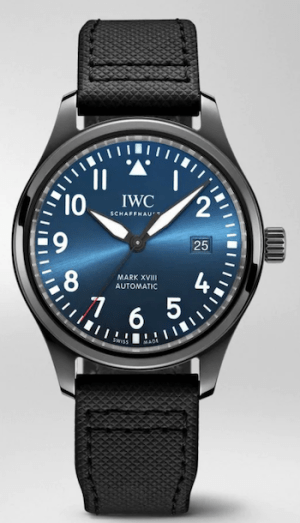
“It is always nice to purchase a new watch,” deployant.com says, not unreasonably. “But what if you are able to achieve a win-win situation, by doing good for a social cause at the same time?” Well then you’re supporting greenwashing – “a form of marketing spin in which green PR and green marketing are deceptively used to persuade the public that an organization’s products, aims and policies are environmentally friendly and therefore ‘better’.” How do we know this?
None of the mainstream watchmakers highlighted in the article – Oris, IWC or Breitling – tell the public what percentage of their “good cause” watch’s purchase price goes to their designated charity. Or how much money they donate to the charity, generally.

Hope and change in their pocket. Truth be told, these watchmakers are exploiting both their chosen charity and their customers’ generosity to move the metal.
No wonder, then, that the description of the financial connection between the watchmakers and their “good cause” is vague at best, evasive and misleading at worst.

We’ve taken Oris to task for failing to reveal how much of the $19k Oris Carysfort Reef Limited Edition sticker price went to the Coral Restoration Foundation. deployant.com introduces us to Oris’ latest “win-win” watch, the $2,300 Oris Great Barrier Reef Limited Edition II.
Here’s the Swiss watchmaker’s product page pitch for a product that will generate $4.6m for Oris – should all 2k examples find their way onto reef-loving owners’ wrists:

Oris has joined forces with the Australian Marine Conservation Society (AMCS) to help protect and preserve the Great Barrier Reef, the world’s largest reef system. Oris will make a donation to the charity’s vital work, funded by sales of the limited edition diver’s watch called the Oris Great Barrier Reef Limited Edition II.
What kind of donation, exactly? As in how much money? “A portion of the profits will also be donated to Australian Marine Conservation Society for their conservation efforts as well,” deployant.com proclaims by way of clarification.
Hang on. The profits? Anyone who knows anything about Hollywood accounting knows you never want a percentage of the profit. After expenses are deducted from the gross revenue, the remaining profit can be perishingly small. The actual cash finding its way to the charity could be a relative pittance. It could even be nothing.

IWC’s product page for the $8k IWC Mark XVIII Laureus Sport for Good Foundation watch says nothing about its connection to the organization that rented its name to the German watchmaker. But it is significant. The Laureus celebrity awards gala event makes that clear.

IWC’s news page describes the organization’s good works in general terms, but there’s no mention of the amount of money IWC’s donated to Laureus, either in total or per limited edition watch. Could it be the same percentage as it is for any other IWC watch? It could!
On that topic, deployant.com says only that “part of the proceeds will be used to support the foundation and its initiatives.” If all 1500 Pilot’s land safely in customer’s collections, there’ll be $12m to part out. So what part would that be?

Breitling’s product page for their $6,250 greenwashed model is the vaguest of them all. “The Superocean Heritage Ocean Conservancy Limited Edition comes with a strong message: alongside the Ocean Conservancy organization Breitling wishes to lead the fight against ocean pollution.”

deployant.com translates: “Breitling will be contributing proceeds from the sale of the watches to conserving the oceans by supporting projects like the Bali beach clean-up that was organised in 2019.”
Like the Bali clean-up, but not that. So . . . what? If all 1k sea-supporting Superoceans sell, Breitling will rake-in $6.25m. Does the Ocean Conservancy get some of that money? How much? Who else gets what?
Well-meaning watch buyers purchasing these pieces get the satisfaction of knowing they’re supporting a worthwhile charity. But they’re also getting taken for a ride. Not to put too fine a point on it, Oris, Breitling and IWC are greenwashing these products and reaping significant profits, depriving charities of wealthy watch buyers’ direct contributions.
If you want to support a charity, send the charity a check. They’ll get 100 percent of your money and you’ll be free to buy a watch that’s not greenwashing your greenbacks, exploiting your philanthropy for the watchmaker’s bottom line.

[…] certainly take heart in the growth of the “climate change” movement. And approve of watchmakers’ greenwashing. Which continues today, with the Element One Limited Edition Earth Day watch . . […]